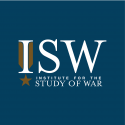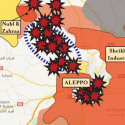A New Strategy Against ISIS and al Qaeda
Mar 14, 2017 - Kimberly KaganThe U.S. has been relying too heavily on Shiites and Kurds. It needs to cultivate Sunni Arab partners.
PLANEX series from late 2015/early 2016
The U.S. has been relying too heavily on Shiites and Kurds. It needs to cultivate Sunni Arab partners.

Syrian President Bashar al-Assad’s regime is neither sovereign nor a viable U.S. partner against ISIS and al-Qaeda. Russia and Iran have penetrated the Syrian Arab Army’s command-and-control authorities at all levels and propped up the force by providing the bulk of its offensive combat power. The pro-regime coalition cannot secure all of Syria and primarily serves as a vehicle for Moscow and Tehran’s regional power projection.

Al Qaeda in Syria has resumed offensive operations against the Syrian regime in northern Syria after the fall of Aleppo City. The recapture of Aleppo City by Syrian president Bashar al Assad and his external backers was a turning point in the Syrian civil war, but it did not seal Assad’s victory. It was instead a victory for Al Qaeda because it defeated Al Qaeda’s main competitors in northern Syria. Al Qaeda consolidated its strength and resumed offensive operations against pro-Assad forces in February 2017. Pro-Assad forces could begin to lose terrain to Al Qaeda. Al Qaeda will increasingly pose a threat to the West as its strength in northern Syria grows. The contest between Al Qaeda and pro-Assad forces, which include Iran and Russia, will increasingly challenge U.S. policy options in Syria.

Iranian military cooperation with Russia in Syria is dramatically increasing Tehran’s ability to plan and conduct complex conventional operations.
Iran is transforming its military to be able to conduct quasi-conventional warfare hundreds of miles from its borders. This capability, which very few states in the world have, will fundamentally alter the strategic calculus and balance of power within the Middle East. It is not a transitory phenomenon. Iranian military leaders have rotated troops from across the Islamic Revolutionary Guards Corps, Artesh, and Basij into Syria in order to expose a significant portion of its force to this kind of operation and warfare. Iran intends to continue along the path of developing a conventional force-projection capability.
International negotiations to reach a political settlement in Syria have resumed, although serious challenges remain to reaching a political settlement. The talks follow two weeks of a “cessation of hostilities” in which the Russian air campaign in Syria decreased notably, though it did not entirely cease. Putin announced that he would withdraw some airframes from Syria on March 15, incentivizing both Assad and the opposition to engage in Geneva.
International negotiations to reach a political settlement in Syria have resumed, although serious challenges remain to reaching a political settlement. The talks follow two weeks of a “cessation of hostilities” in which the Russian air campaign in Syria decreased notably, though it did not entirely cease. Putin announced that he would withdraw some airframes from Syria on March 15, incentivizing both Assad and the opposition to engage in Geneva.
American strategy toward ISIS has misidentified the group’s center of gravity and is inadvertently strengthening Syrian al Qaeda affiliate Jabhat al Nusra. The US approach presumes that regaining Mosul in Iraq and ar Raqqa in Syria will cause ISIS to collapse, and it is not operating against Jabhat al Nusra in any meaningful way.